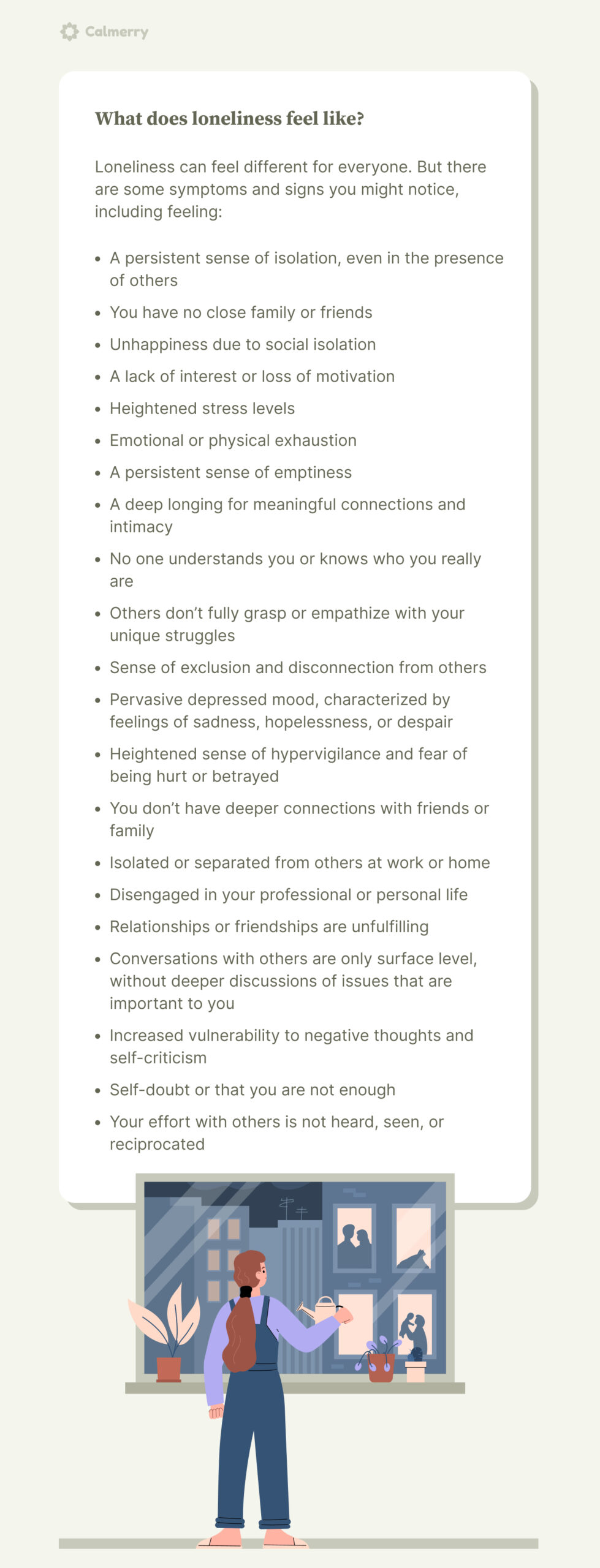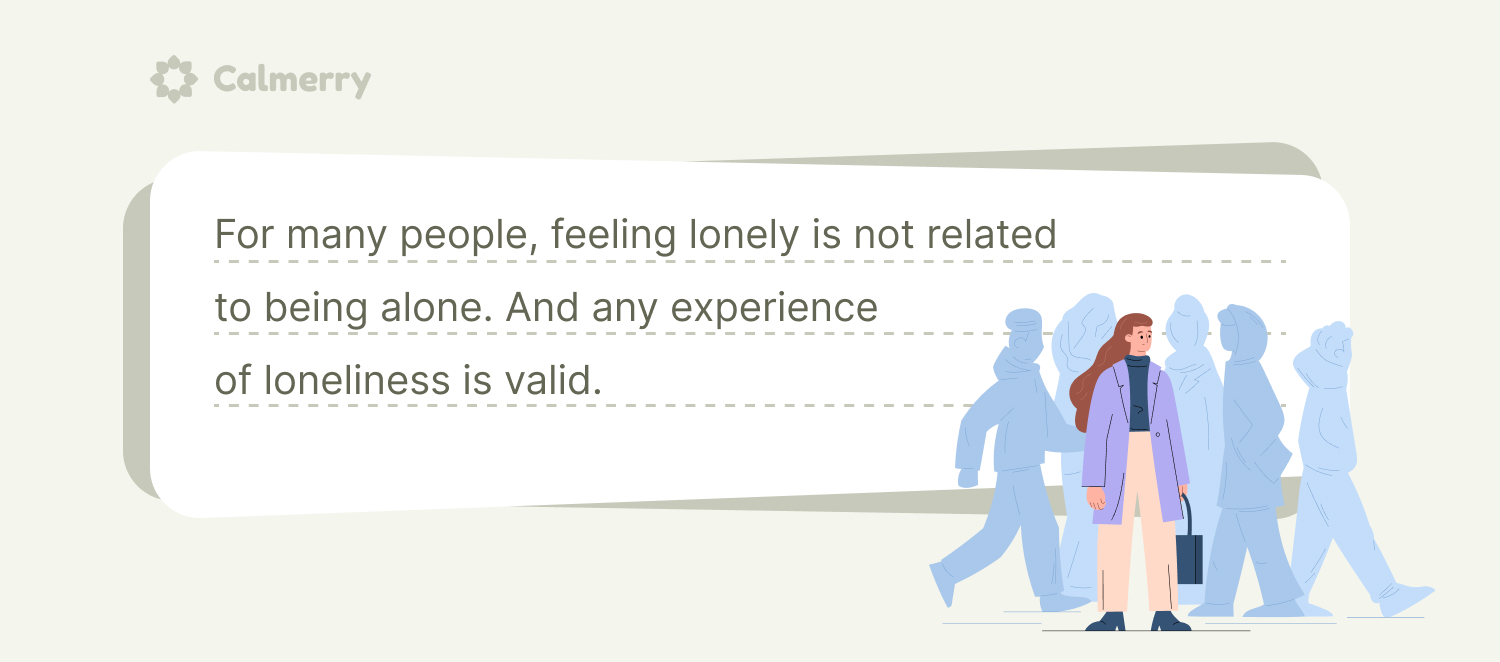How to Deal with Loneliness: 5 Strategies for Finding Connection and Joy

Table of Contents
Many of us will have felt lonely at some point in our lives. Loneliness might last just a few hours, or several days, or linger for years.
Research by the Harvard Graduate School of Education has shown that an epidemic of loneliness is being seen across America following the coronavirus pandemic.
So, how can we find connection and joy when we feel lonely? Our 5 strategies will show you how to overcome loneliness.
What is loneliness?
Loneliness is a subjective feeling and a deeply personal experience. It’s often felt when you do not have as much social contact as you might like. But it can also occur because of the complex social or personal challenges, or if the social contact you do have lacks quality or doesn’t feel meaningful.
Loneliness can be felt at any time, but you may notice a pattern to this feeling.
For example, you may feel lonelier in the evenings, at weekends, or during the holiday seasons. Loneliness may feel worse in the winter months when it’s harder to get outside or during summer when other people might be on vacation.
And acute loneliness may last for a few days, whereas chronic loneliness can persist for years.
Alone vs. lonely
It is important to remember that being lonely is not the same as feeling alone. Some people who live alone or are socially isolated may never feel lonely.
In fact, many people enjoy solitude and look forward to having time alone. But this is not everyone’s experience, and learning to make the most of having time to yourself can take some practice.
For other people, feeling lonely is not related to being alone. You might be surrounded by family or friends while still experiencing extreme feelings of loneliness. This subjective experience is just as valid as that of someone who feels lonely due to social isolation.
You might feel lonely for many reasons despite being surrounded by people. For example, you may:
- Feel your friendships lack depth
- Have strained family relationships
- Or find that the time you spend with others feels functional rather than enjoyable.
What does loneliness feel like?

Loneliness can feel different for everyone. But there are some symptoms and signs you might notice, including feeling:
- A persistent sense of isolation, even in the presence of others
- You have no close family or friends
- Unhappiness due to social isolation
- A lack of interest or loss of motivation
- Heightened stress levels
- Emotional or physical exhaustion
- A persistent sense of emptiness
- A deep longing for meaningful connections and intimacy
- No one understands you or knows who you really are
- Others don’t fully grasp or empathize with your unique struggles
- Sense of exclusion and disconnection from others
- Pervasive depressed mood, characterized by feelings of sadness, hopelessness, or despair
- Heightened sense of hypervigilance and fear of being hurt or betrayed
- You don’t have deeper connections with friends or family
- Isolated or separated from others at work or home
- Disengaged in your professional or personal life
- Relationships or friendships are unfulfilling
- Conversations with others are only surface level, without deeper discussions of issues that are important to you
- Increased vulnerability to negative thoughts and self-criticism
- Self-doubt or that you are not enough
- Your effort with others is not heard, seen, or reciprocated
Loneliness can also lead to physical symptoms. Research has highlighted that lonely adults aged 50 or over may be at greater risk of serious health conditions, including:
- Dementia
- Heart disease
- Stroke
- Depression symptoms
- Anxiety and other mental health problems
When you feel lonely, you may find you have difficulty sleeping, your appetite goes up or down, you don’t feel like exercising, you spend a lot of time watching TV or scrolling on your phone, or you feel that you are living with a constantly unfulfilled state of mind.
As loneliness can greatly impact your emotional and physical well-being, it is extremely important to understand why you might be experiencing loneliness and what you can do to deal with it.
Why am I so lonely?
We know that loneliness can occur even if you are surrounded by other people. Identifying the likely cause of your own loneliness is a great first step in managing the way you feel.
Older adults are likely to be socially isolated, which may increase the risk of loneliness. However, there are many diverse and complex causes of loneliness, including:
- Chronic illness – this may limit how much you can socialize or how easy it is to join others in social activities
- Mental health conditions – loneliness and mental health conditions often intersect, creating a complex relationship. Conditions such as depression, anxiety disorders, and post-traumatic stress disorder (PTSD) can intensify feelings of loneliness. Conversely, chronic loneliness can contribute to the development or exacerbation of mental health issues
- Hearing loss – if you find it hard to hear what is going on, you might struggle to maintain meaningful relationships with others
- Loss of family or friends – losing those who are close to you due to relocation, friendships drifting apart, family estrangement, or death can leave a huge gap in your life
- Living alone – you may go days without seeing or speaking to anyone else
- Relationship break-ups or divorce – if you are lonely and single, you may be coping with the loss of your ex-partner as well as any of their friends or family who you may no longer see
- Unhappy or unfulfilling relationships – even when you have a partner, you may be feeling lonely in a relationship
- Moving to a new city, state, or country – it can be hard to get to know new people
- Working from home – you may mourn the loss of colleagues or the office environment
- Changing jobs or schools – feelings of isolation may occur until you can forge new friendships and relationships
- Cultural Influences – cultural norms, societal expectations, and traditions may shape individuals’ social interactions and sense of belonging. Furthermore, language barriers, immigration, and acculturation challenges can also contribute to feelings of isolation and loneliness.
- Discrimination – experiencing prejudice, bias, bullying, or being socially excluded can lead to a sense of isolation and disconnection.
- Trauma and loss – experiencing traumatic events or significant losses, such as the death of a loved one, divorce, or separation, can leave individuals feeling isolated and struggling to find new sources of connection.
For many people, feeling lonely is not related to being alone. And any experience of loneliness is valid.

How to deal with loneliness
Once you can identify when and possibly why you are feeling lonely, you may wonder what to do when you feel lonely.
Our list of practical strategies will show you how to overcome loneliness and find joy in your life. These tips are also a great starting point for boosting your mood if you feel isolated.
1. Learn to get comfortable with your own company
If you fear being alone, it’s time to start addressing it. Indeed, if you’re feeling lonely and depressed, it can be hard to stop these feelings from becoming a downward spiral of upset.
However, finding ways to feel comfortable when you’re alone is one of the best ways to avoid isolation leading to loneliness.
You’re your best friend. Think about hobbies, activities, or events you might like participating in. This can range from simple activities like reading a new book to bigger events like booking a trip to see your favorite singer. Some people find that spending time with pets and other animals combats loneliness.
Realizing that it is possible to enjoy life when you are on your own is a big step forward.
2. Build deep and meaningful connections
If you are someone who needs a human connection to avoid feelings of loneliness, think about ways to make new connections with others.
Returning to work in the office, joining a sports team, getting in touch with old friends, or finding online communities filled with like-minded individuals can bring happiness and support to your life.
3. Open up to family or friends about how you’re feeling
If you have social connections, but they feel shallow, consider talking to your family or friends about your desire for deeper conversations with them. Being honest about how lonely and sad you feel may help others understand what you need from them.
In some cases, you may find that your family has had their own anxieties about being brave and opening up about their thoughts and feelings.
Starting a conversation by saying, “Hey, I feel lonely all the time. Can we talk?” might sound scary, but it could help to be the beginning of strengthening your relationship long-term.
4. Look after yourself
While you begin to manage loneliness, it is important to take care of your mental and physical well-being.
Vital self-care, such as eating well, prioritizing sleep, getting regular exercise, making time for hobbies, and restful activities, can help you feel better prepared to manage loneliness.
If you know that loneliness affects you at a certain time of the day or year, try to make plans in advance to help you feel better at this time.
5. Avoid making comparisons
Social media makes it easy to see what friends and family are doing. But this can make you feel low or inadequate if your life might seem to fall short of everyone else’s when compared to those positive photos on social media.
Rather than making comparisons, write down a list of all the positives in your life. If you see someone else doing something that you could enjoy, consider whether trying something similar could bring excitement or happiness to your life.
Seek professional support
It’s important to recognize that while the activities above can serve as a starting point for addressing loneliness, overcoming loneliness often requires a personalized and multi-dimensional approach.
Seeking professional support can be immensely valuable in navigating and addressing the complex challenges and experiences associated with loneliness. Talking to a counselor offline or online can help you understand how you feel and how you can cope with loneliness in your unique case.
Calmerry has licensed and experienced counselors who can help you explore personalized strategies for managing loneliness. Choosing online therapy means you can access the support you need at a time and location that is convenient to you.
Final thoughts
If you regularly think, “Oh, I feel so lonely…”, many other people understand what you are going through. Loneliness is increasing in America, but there are plenty of strategies you can try to not only reduce feelings of isolation but to find peace, acceptance, and happiness in your own company.
To learn more about how Calmerry online therapy could help you, get in touch with us today.
-
Learn morePersonalized online therapyChoose video, messaging, or both to fit your schedule and comfort. Get matched with your therapist within 1 hour.
-
Learn moreOne 60-minute live video sessionSee how online therapy works and get quick support with a single therapy session. No commitments.


